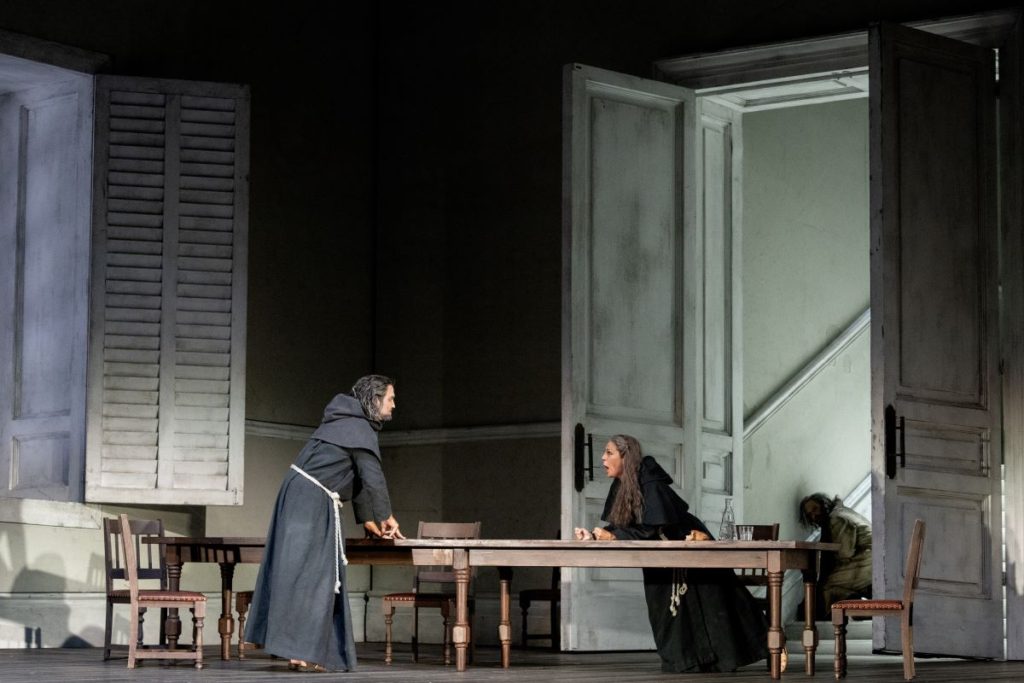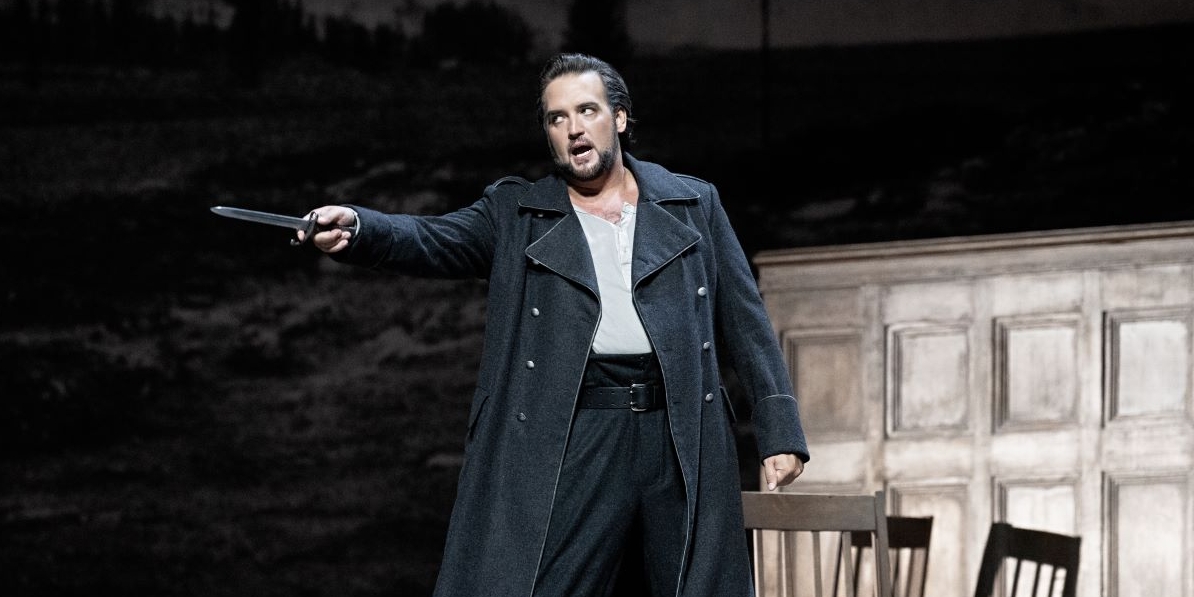La Forza del Destino is a Verdi masterpiece. Extraordinary melodies, extreme emotions, violence, confrontation, challenging main roles, and great choruses.
Forza has a reputation for being cursed. The great American baritone Leonard Warren died onstage after launching into ‘morir, tremenda causa’, (to die, how terrible). Theatres have inexplicably lost power during performances; Corelli performed rituals before during and after performances, and superstitious Pavarotti refused to sing it.
This is the first revival of the Christof Loy 2019 production with Anna Netrebko and Jonas Kauffman, where seats resold well above the purchase price. Netrebko no longer sings here for insufficiently condemning the Ukraine war, and Kauffman has been vocally suffering, as heard in ROH Werther (the curse strikes again?)
During the overture, we see scenes of the Calatrava children growing up; Carlo kills his younger brother and relentlessly bullies his religious sister Leonora. The single set is used in different ways to impressive effect, except for the end when Leonora’s hermit cave is a cupboard, with a large dining table and chairs outside to collect her bread rations.
Leonora loves Alvaro, an Inca prince, deemed racially unsuitable. Leonora says goodnight to her father, the Marquis de Calatrava (American bass James Cresswell in fine form), then awaits Alvaro as they plan to escape to get married. The shutters open, Alvaro jumps from the window, fresh air leaping into the stultifying atmosphere. Leonora’s father surprises them, Alvaro draws a gun, discards it, and through either destiny or really bad luck, it goes off killing Calatrava, who dies cursing Leonora. A Verdi curse is a terrible thing (Rigoletto, Boccanegra): it never ends well. This scene is replayed in slow-motion on screens throughout the opera. It paralyses the lives of Leonora, Alvaro, and Carlo forever. Carlo spends his life pursuing them for revenge.
American/Canadian soprano Sondra Radvanovsky as Leonora, lacks Netrebko’s beauty of tone, but she is spine-tingling thrilling. She sings the testing role of Leonora with ease: she has a huge voice when she wants to use it, which is much of the time, but has effortless floated fil di voce pianissimi (sang very softly), at will, demonstrated ‘la vergine degli angeli’ and ‘pace, pace’ She has an extraordinary magnetic intensity to her singing and acting, and from the moment of her father’s death; she is haunted by the horror of the event, resulting in the extreme religious fervour we see growing as a child, portrayed by a religious fit before Padre Guardiano – a desperation to atone by living the rest of her life as a hermit. She is mesmerising.
American tenor, Brian Jagde as Alvaro, is exciting and well matches with Radvanovsky. Alvaro suits his big, generous, dramatic tenor, which he transforms to romantic warmth, subtlety and melting pianissimi. He displays passion with Leonora, refining his instrument well as the penitent monk. ‘Solenne in quest’ora’ and the duelling duets with Carlo are thrilling. His Italian is excellent: I understood every word.

Canadian baritone Etienne Dupuis, as Carlo, is disappointingly lightweight. Despite acting deranged psychopath Carlo well, his voice sounds more like a second tenor than baritone, with an easy top register, but fails to hit the bottom notes. Carlo needs a richer, darker sound. The Alvaro/Carlo duets thus display vocal imbalance and lack of voice contrast.
Russian bass Yevgeny Stavinsky as Padre Guardiano, is transformed from a robed old man in 2019, to a suited younger priest. His fine bass voice lacks Ferruccio Furlanetto’s authority in 2019: he inexplicably takes a back seat when the final family tragedy plays out in front of him, instead closing the huge back door on dying Carlo, enabling Carlo to kill Leonora.
The two scenes with Preziosilla, (a wonderful role for a mezzo without the vocal weight of Amneris), is ably sung by Russian mezzo Vasilisa Berzhanskaya. The scenes contrast with the darkness elsewhere, ‘venite all’indovina’ and ‘Rataplan’ provide rousing choruses and dance.
With the suffering caused by the Ukraine war, the war scenes are more poignant than in 2019.
Russian baritone Rodion Pogossov, a former Met young artist, perfectly depicts Padre Melitone, the nasty miserable priest. Melitone is not a comic character – the comedy is in his accompanying music; Verdi makes fun of him.
Italian tenor, Carlo Bosi, is a sympathetic Trabuco.
Conductor Sir Mark Elder coaxes the best out of the huge score.
This is a highly recommended blood-curdling night at the opera.

